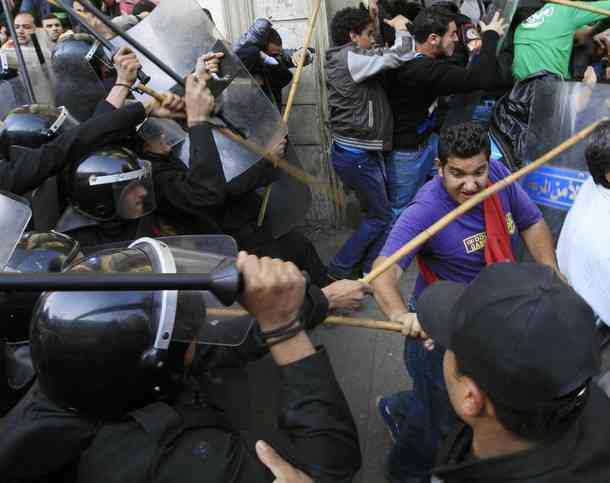Protesters and riot police clashed in Cairo's Tahrir square Saturday, wounding around 500 people, after police dispersed a sit-in by demonstrators demanding the ruling military transfer power swiftly to a civilian government, Reuters reported.
The police pulled down tents of about 100 protesters who had camped in the square overnight after a demonstration Friday of about 50,000 people, mostly Islamists, against the military leadership.
The action prompted around 5,000 protesters to return and clashes broke out.
The violence could cast a shadow over Egypt's parliamentary elections, which are set to begin on November 28, the first since former President Hosni Mubarak's removal and meant to be a major step toward a civilian democratic system.
Police fired blank shots and rubber bullets at protesters, witnesses said. Two police cars were set on fire in Tahrir square after witnesses said they had seen protesters climb into the vehicles. A third vehicle, close to the headquarters of the Arab League, was also on fire, a witness said.
"The people want to topple the regime!" hundreds of youths chanted as they rushed toward a line of helmeted police.
Riot police later fired tear gas to try to clear the area and they closed off streets leading to the square, witnesses said. They beat protesters with batons while demonstrators broke off cement from sidewalks to throw at the police.
"We are fighting them non-stop," shouted one protester.
The Muslim Brotherhood's Freedom and Justice Party said in a statement earlier it "denounced the breakup of the Tahrir sit-in by force."
"The break-up (of the sit-in) ... led to injuries, some serious, according to some media reports," the party said.
"(This is) reminiscent of the practices of the defunct regime's interior ministry."
The April 6th Youth Movement said in a statement it said opposed the use of force against peaceful protesters and demanded that the interior minister "leave immediately."
"TROUBLEMAKERS"
State news agency MENA cited a health ministry spokesman as saying that 507 people had been wounded in the clashes.
State television reported that "18 troublemakers had been arrested and legal procedures were being taken."
Friday's rally appeared to be the biggest Islamist challenge to military rule since the largely secular uprising that toppled Mubarak in February.
Protesters expressed their anger at a constitutional draft that Deputy Prime Minister Ali al-Silmi showed to political groups earlier this month which would give the army exclusive authority over its internal affairs and budget.
Parliamentary polls could be disrupted if parties and the government fail to resolve the row over the constitutional proposal that would deny parliamentary oversight of the army, potentially allowing it to defy an elected government.
MENA reported later Saturday that al-Silmi had amended clauses 9 and 10 of the constitutional proposal.
The new proposal omits the segment of clause 9 that said the armed forces were responsible for protecting (Egypt's) constitutional legitimacy, MENA said. It also amended the part which said the armed forces alone would be responsible for its internal affairs, budget and legislation.
Clause 10 was also amended to say that a National Defense Council would be created and presided over by the president.
Al-Silmi said the committee chosen to write Egypt's new constitution would not be confined to the larger groups in parliament to ensure "a constitution that reflects national consensus and receives the consent of all segments of society."
But political analyst Ezzedine Fishere said he did not expect the amendments to appease Islamist groups who had taken to Tahrir Friday.
"There are those who oppose clauses 9 and 10 ... but the main problem of the Muslim Brotherhood and the Salafi currents is with the remaining elements of the document," said Fishere.
"(Islamists) see that they will get a majority in parliament and hence want total freedom in choosing the constitutional committee and writing the constitution," he said.
Analysts suggest Islamists could win 40 percent of seats, with a big portion going to the Brotherhood.
"What is happening now is a showdown between the two factions ... an on-the-ground confrontation with each party trying to enforce its will, the military council from one end and the Islamist currents from the other," Fishere said.






